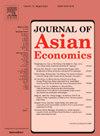父母工作时间对子女人力资本形成的影响:基于中国家庭的实证研究
IF 3.4
3区 经济学
Q1 ECONOMICS
引用次数: 0
摘要
当代中国家庭不断增加的工作量和工作时间引起了人们对父母缺席对儿童认知和非认知表现的潜在不利影响的担忧。本研究采用了一项全国性调查,即中国家庭小组研究(CFPS)数据集,重点关注16岁以下的青少年,揭示了儿童的认知表现依赖于父母的工作时间分配,进而影响儿童的学习成绩。本研究分析了2012年至2018年间进行的四项中国家庭小组研究的数据,研究了父母平均每周工作时间对9-15岁孩子学习成绩的影响。研究结果表明,随着父母工作时间的延长,他们孩子的考试成绩和班级排名往往会下降。然而,这种影响因儿童性别等因素而异。母亲的受教育程度和每月亲子讨论或争吵的频率可以减轻父母工作时间对孩子学业成绩的不利影响。研究表明,除了投资于孩子的教育之外,家长还应该优先考虑与孩子的积极互动。决策者还应执行有关工作时间的规定,以保护工人及其子女的权利。本文章由计算机程序翻译,如有差异,请以英文原文为准。
Investigating the influence of parents' work hours on children's human capital formation: An empirical study of Chinese families
The increasing workload and work hours among contemporary Chinese families have raised concerns about the potential adverse effects of parental absence on children's cognitive and noncognitive performance. This research applied a nationwide survey, the Chinese Family Panel Studies (CFPS) dataset, focusing on teenagers under the age of 16, to reveal children’s recognition performance relying on parents’ time allocation at work, which subsequently affects children’s grades in school. This study analyzed data from four China Family Panel Studies conducted between 2012 and 2018, examining the impact of parental average weekly working hours on the academic performance of their children aged 9–15. The finding showed that as parents work longer hours, their children's test scores and class rankings tend to decline. However, this effect varies depending on factors such as children’ gender. Mothers' education level and the frequency of parent-child discussions or arguments each month play a role in mitigating the adverse impact of parental working hours on children's academic performance. The study suggests that in addition to investing in their children's education, families should prioritize positive interactions with their children. Policy-makers should also implement regulations on working hours to protect workers and their children's rights.
求助全文
通过发布文献求助,成功后即可免费获取论文全文。
去求助
来源期刊

Journal of Asian Economics
ECONOMICS-
CiteScore
4.70
自引率
9.40%
发文量
90
期刊介绍:
The Journal of Asian Economics provides a forum for publication of increasingly growing research in Asian economic studies and a unique forum for continental Asian economic studies with focus on (i) special studies in adaptive innovation paradigms in Asian economic regimes, (ii) studies relative to unique dimensions of Asian economic development paradigm, as they are investigated by researchers, (iii) comparative studies of development paradigms in other developing continents, Latin America and Africa, (iv) the emerging new pattern of comparative advantages between Asian countries and the United States and North America.
 求助内容:
求助内容: 应助结果提醒方式:
应助结果提醒方式:


